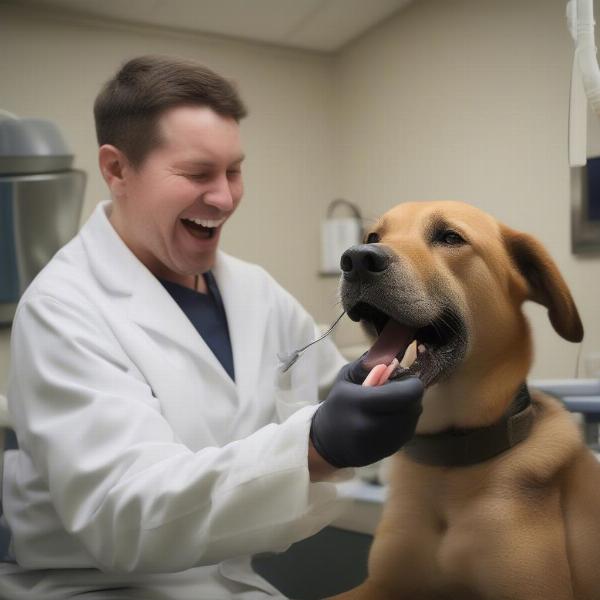The phrase “titanium teeth navy SEAL dog” often conjures images of formidable canines with enhanced biting power, ready for any combat situation. While the idea is captivating, the reality of dental implants in military working dogs (MWDs), specifically Navy SEAL dogs, is far more nuanced. This article delves into the truth about dental care for these elite canine warriors, exploring the practical considerations, ethical implications, and the overall well-being of these invaluable partners.
Dental health is crucial for all dogs, but even more so for working dogs whose duties often rely on a strong, healthy bite. While titanium crowns and implants are sometimes used in veterinary dentistry to restore damaged or missing teeth, their application in Navy SEAL dogs isn’t about creating super-soldiers but rather ensuring the dogs can continue to perform their vital roles effectively and comfortably.
The Importance of Dental Health in Military Working Dogs
Military working dogs, including those serving with the Navy SEALs, perform demanding tasks, from detecting explosives and narcotics to apprehending suspects and providing security. These duties necessitate a healthy bite, and any dental issues can significantly impact their ability to perform effectively. Regular dental check-ups and preventative care are essential for maintaining the health and working life of these canine partners.
Are Titanium Teeth Common in MWDs?
While the use of titanium implants in veterinary dentistry is increasing, it’s not a standard practice for MWDs, including Navy SEAL dogs. Decisions regarding dental procedures are made on a case-by-case basis, prioritizing the dog’s overall health and welfare. While titanium implants can be a valuable solution for restoring function and alleviating pain in certain situations, they are not routinely used to enhance biting power.
The Ethics of Enhancing a Dog’s Bite
The idea of intentionally enhancing a dog’s bite for military purposes raises ethical concerns. Animal welfare organizations and veterinary professionals prioritize the responsible and humane treatment of animals, including working dogs. Any procedure that could potentially increase the risk of injury to the dog or another living being would be carefully evaluated and likely deemed inappropriate.
Common Dental Procedures for MWDs
Regular dental cleanings, extractions of diseased teeth, and treatment of gum disease are the most common dental procedures performed on MWDs. These procedures aim to maintain oral health, prevent pain, and ensure the dogs can continue to perform their duties effectively.
What if a Tooth Gets Damaged?
In cases of severe tooth damage, veterinary dentists may opt for restorative procedures such as root canals or crowns. Titanium crowns offer durability and strength, making them a suitable option for working dogs who put significant stress on their teeth.
Focusing on Prevention: The Key to Canine Dental Health
Preventing dental problems is the best approach for all dogs, including MWDs. Regular brushing, dental chews, and a healthy diet can significantly reduce the risk of developing dental disease.
 Navy SEAL Dog Receiving Dental Care
Navy SEAL Dog Receiving Dental Care
Conclusion
While the concept of “titanium teeth navy SEAL dog” might spark intrigue, the reality is that dental care for these exceptional canines focuses on maintaining natural health and function, not creating super-dogs. Prioritizing preventative care and addressing dental issues promptly ensures these invaluable partners can continue to serve with optimal health and well-being.
FAQs
- Do Navy SEAL dogs have metal teeth? It’s highly unlikely. While titanium crowns or implants might be used in specific cases to repair damaged teeth, they’re not routinely used to enhance biting power.
- What kind of dental care do military working dogs receive? MWDs receive regular dental checkups, cleanings, and any necessary treatments for dental issues, similar to the care provided for pet dogs.
- Are titanium implants safe for dogs? Titanium implants are generally considered safe and biocompatible for dogs when performed by a qualified veterinary dentist.
- How can I keep my dog’s teeth healthy? Regular brushing, dental chews, and a healthy diet can help prevent dental disease in dogs.
- What are the signs of dental problems in dogs? Bad breath, difficulty eating, excessive drooling, and swollen gums can indicate dental problems.
- How often should my dog see a vet for dental care? Annual dental checkups are recommended, but your vet may advise more frequent visits based on your dog’s specific needs.
- Is it expensive to treat dental problems in dogs? The cost of dental treatment can vary depending on the severity of the problem and the procedures required.
ILM Dog is a leading online resource dedicated to providing dog owners worldwide with reliable and practical information on all aspects of dog care and wellbeing. From breed selection and health advice to training tips and product recommendations, we strive to empower dog owners with the knowledge and resources they need to provide the best possible care for their canine companions. Whether you’re a seasoned dog owner or just starting your journey, ILM Dog offers valuable insights and guidance to help you navigate every stage of dog ownership. Contact us at [email protected] or +44 20-3965-8624 for any inquiries. Visit ILM Dog for more expert advice on dog care.